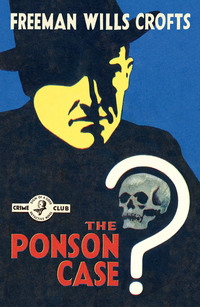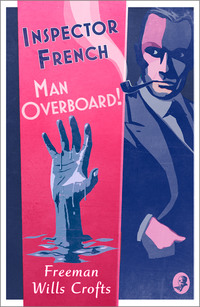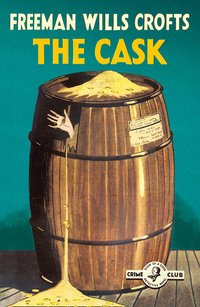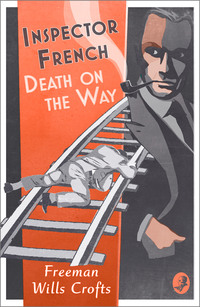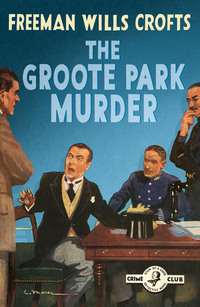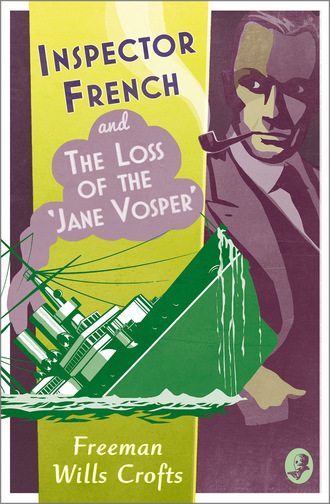
Полная версия
‘The nearest ship is the Barmore of the British Latin States Line. She’s 90 miles south of us and coming to meet us—bound for London. The next is the South African liner Scipio, 150 miles nor’-east, and northward bound. There’s nothing else very close, but the Para of the Portuguese American Line is in Funchal Harbour with steam up.’
Hassell nodded. The Scipio was out of the question, but the Barmore would appear to suit very well. Hassell knew her as the crack vessel of his owner’s rivals. She was a 7000-ton boat, and he believed could do 12 knots at a pinch. With the knot or two the Jane Vosper was making, the Barmore should be with them in about six and a half hours, say shortly before midday.
It shouldn’t cost his firm much, Hassell thought, to get the Barmore to hurry up a bit. Then if the bulkheads gave and they were able to get clear of the ship, they should be picked up all right.
On the other hand, Hassell wanted to bring his ship to port, and it might be better to try to get the Para to come out and stand by while they worked the 300 miles to Funchal.
Without speaking, Hassell turned on his heel and went into the chart-room. There with the help of his charts he faced the position. It was a hell of a long way to Funchal, but it was a deal farther to any other port. Lisbon, Cadiz, Gibraltar, Casablanca; he considered them all. Funchal was by far the nearest. Moreover, it was on the line of his company’s boats. His cargo could be transhipped there with less disorganization of the service than elsewhere. Further, to go towards Funchal would be to meet the Barmore. In any other direction they mightn’t get help.
For two whole minutes Hassell weighed the matter. Then, his mind made up, he returned to the wireless-room.
‘Tell the Barmore we’ve had an explosion and got No. 2 hold flooded, and ask her to come along as quickly as she can. Say we’re not in immediate danger, but that we should be if anything gave way.’
Crabbe said, ‘Right, sir,’ and began to call, while Hassell bent over the desk. He took a message form and wrote, slowly and with thought. Heading it with the code name and address of his firm, he went on:
‘S.S. Jane Vosper L. 36° ·19´ N. 14° ·44´ W. Stop. Regret to state have had series of unexplained explosions in No. 2 hold, which has been pierced and is flooded. Stop. Expect to be able to reach Funchal but have asked Barmore to look out for us. Stop. No immediate danger. Stop. Hassell.’
‘Send that to Funchal to be cabled home when you’ve finished with the Barmore,’ he ordered, and turned to go back to the bridge.
As he looked out of the door of the wireless-room, which, being on the port side of the ship, faced east, he saw that dawn was already breaking. The sky and horizon were lightening and he could dimly see the swells moving past, now almost smooth and free from white. Soon it would be daylight, and there would be one handicapping difficulty the less to meet.
But it was not on the sea and the horizon that his attention lingered. Turning from the consideration of their plans to the immediate present, he gave a gasp. The ship was tilted forward; unmistakably. God, but she was down by the head! A glance from the bridge horrified him. The forward end of the well-deck was down nearly level with the water, and the fo’c’sle was but little above it.
Hassell stared in dismay. Then he congratulated himself that the Jane Vosper was not fully loaded. She was not down to her Plimsoll marks. This had been regrettable from the point of view of the profits of the voyage, though it made her steadier and easier to manage than if deeper in the water. But now this matter had become of importance. This very buoyancy might prove her salvation. Every extra inch of freeboard she had would stand to her in her present state.
As Hassell watched, a huge swell came rolling forward. With the wind so much down, there was but little broken water on its crest. But still it was a pretty big sea. Fascinated, he watched it sweep down on them.
Normally the Jane Vosper would have swung up her bows and crested it with ease. But now she hung in its path, as if uncertain, as if waiting for some order to make the required move.
It came on relentless, without haste, without delay. It struck the bows a crash that jarred the planks of the bridge like another explosion. It came on over the fo’c’sle as if the latter had not been there, and fell, hundreds of tons of it, on to the well-deck. It surged against the amidships fittings, sending a burst of green water up over the bridge.
Captain Hassell, clinging to the rail for dear life, could see nothing of his ship forward. There was in front of him only a white seethe of foaming water. The Jane Vosper staggered as if she had received a mortal blow.
‘God!’ thought Hassell, ‘she’s gone! She’ll never come up again!’
For breathless seconds her fate seemed to hang in the balance. Then slowly her bow began to rise. The water forward began to pour away, and the fo’c’sle appeared, black and rugged against the creaming foam.
Hassell moved beside his second mate. ‘Go down and see what Arlow is doing,’ he said quietly. ‘If we can spare the men I should like to rig a sea anchor. Come up again and report.’
Blair hurried off, and Hassell went again to the engine-room tube. ‘Could you spare the time to come up and speak to me?’ he asked the chief.
‘We have oor hands full wi’ the stern being up in the air and her racing every ither minute,’ answered Mactavish, ‘but I’ll be able to run up for a moment.’
Hassell moved back to the rail. Thank heaven it was getting light at last. And the sea was falling quickly. Perhaps he was wrong about that sea anchor. Probably by the time they got it out it wouldn’t be needed. Probably the hands could be more usefully employed below. Well, he would hear what Mactavish and Arlow advised, and then he would have a look at the damage himself, and then he would decide.
‘She’s weel enough doon by the head,’ said a voice at his shoulder in broad Scotch.
‘She’s down as far as she’ll go,’ Hassell returned firmly. ‘I want a word with you, Mac. You still all right below?’
‘Aye, I canna complain so far as the engine-room’s concerned.’
‘We’ll have to shore those bulkheads. The Lord knows how they’ve been weakened by the explosions. If they hold, we’re all right. If they go—’ He shrugged. ‘What about it?’
‘I was thinking it would come to that and I’ve been getting forward stuff. I canna promise much with the stuff we’ve got—only a few old beams. But we’ll do the best we can.’
Hassell knew the chief would never admit that any materials he had were suitable for the job he was given, nor that the work could be satisfactorily carried out. But he knew also that if Mactavish failed in it, no other man afloat would succeed.
‘Right,’ he said. ‘Carry on, will you.’ Then he caught sight of the first officer coming along the deck. ‘Wait,’ he went on. ‘Let’s hear what Arlow has to say before you go. Well, Mr Mate?’
‘No. 2 hold’s full, sir. Right full up to sea level. And it came in so quickly that there’s no earthly use in pumping. She must have a hole as big as a ventilator in her bottom.’
‘No. 1 hold still dry?’
‘Still dry, sir.’
‘Well, Mr Arlow, I want that bulkhead shored. The glass is rising and we’ll have good weather presently, and I’m going to work her under her own steam into Funchal. All the same, the Barmore’s bearing down on us, though I’d rather not stop her if I can help. Go ahead with that shoring, and I’ll come down to see you presently. Where’s Mr Blair?’
‘Carrying on in my place, sir.’
‘Right: send him up when you can.’
Neither of the two men he was speaking to required encouragement to do their best for the ship. And yet Hassell saw that his confident manner had reassured both of them. He had given them this reassurance because that was his job as their superior officer, but it was an assurance that he was far from feeling himself. That Mactavish should be able to make a job of the shoring, he had little doubt. But it was far otherwise in the case of No. 1 hold. There the mate would be hampered by the cargo. He couldn’t get it out to make room to work, because it would be impossible to lift most of it without a winch. And a winch could not be used, because, unless the sea fell very much farther, they dare not uncover the hatch. However, Arlow must just do his best. Here again it was fortunate the hold was not full. They would at least have a certain headroom.
As the mate and Mactavish went down the ladder, Crabbe appeared.
‘The Barmore’s coming full speed, sir,’ he reported. ‘She expects to be here by midday or earlier.’
Hassell nodded. Midday! Would they do it! He knew the enormous stresses the bulkheads were bearing, stresses increased far beyond the normal by the pitching of the ship. He could picture only too well those stresses becoming strains, deformation taking place, an extra pull coming on some rivet, it sheering, and then—It wouldn’t then be long till a whole row of them went. And if a row went … Well, one of those plunges she was taking would simply be her last. She would plough into a wave as she was even then doing, but after it had passed, her bow wouldn’t come up. And the next wave would find it lower still. The stern would rise. The water would creep up the deck. And then …
Hassell sighed, then glanced around him. What a blessing the sea was falling! Though every wave was still sweeping over the fo’c’sle, they were doing so with less and less violence. The wind had practically died down and the hillocks of water were almost smooth and unbroken. Given good weather, she should be able to bear another knot or two, and make Funchal under her own steam without calling on anyone for help. At half-speed, which was the utmost he dare push her to, she should do it in less than three days.
It was now six o’clock and the sun was up. It made a difference, though Hassell didn’t realize it. Unconsciously as he looked at it, the outlook seemed to improve. Things grew more rosy, figuratively as well as literally. This was a nasty experience, but they were going to pull through it. His mind strayed towards the question of dry dock accommodation at Funchal …
Then he returned again to the question of that bulkhead in No. 1 hold. He didn’t think, no matter how much the sea fell, that with the bow as deep in the water as it was, it would be safe to open the hatch. If they did so and they got a wave over, it would probably send her straight to the bottom. They would have to work the cargo back from the face of the plates, get a beam across, put back the cargo, and then make a longitudinal channel or two for the struts. Difficult, but not impossible.
Blair interrupted his thoughts. ‘You want me, sir?’
‘Yes. Take over, will you. I’m going below.’
He turned away, but before he reached the ladder he was struck motionless by another terrible explosion. It came like the others, but worse—much worse. Not only was the sound louder, but the shock, coming up through the planking of the deck, was far more severe. The whole fabric of the ship seemed to stagger. She seemed to stop, as if dumbly protesting at this new calamity. Hassell gasped. For two seconds he stood motionless. Then he turned back to the engine-room tube. He whistled: without reply. At last he heard Mactavish’s voice.
‘Yon’s about done it, I’m thinking,’ the chief declared. ‘The bulkhead’s buckling. Some of the rivets are started, and she’s beginning to weep down the joints.’
‘You’re getting your pumps going, I take it? Better start them for No. 1 hold too. I’ll come down to see you when I hear what’s happened there.’ He turned to Blair. ‘See Arlow and find out how things are with him.’
While waiting for Blair to return, Hassell kept his eyes glued to the ship forward. No, she did not seem to be getting lower in the water. A little more flooding aboard would show; a very little. A very little would put her down altogether. As he had only too vividly pictured, one of those dips that she took would be the last; she just wouldn’t rise again. And all his crew were below. Not one of them would have a dog’s chance …
For a moment temptation assailed him. Was it not his duty to make sure of their lives while he could? After all, the ship and the cargo were insured. His owners wouldn’t be hard hit. The men trusted him. Was he justified in taking a risk with their lives?
Then Blair appeared, and Hassell became once again the master of his steamer and his soul.
‘Water’s leaking into No. 1 hold, sir, but only leaking. Mr Arlow thinks the pumps may keep it under.’
‘Good. Then you take over here. Watch her motion, and if you think she’s settling send for me. If you’re sure she’s going, don’t hesitate to sound Abandon Ship. But don’t do that,’ he smiled crookedly, ‘unless you are sure.’
Hassell passed down the bridge ladder, and entering the deck-house below, made his way through the officers’ quarters and into the upper portion of the engine-room. The air was heavy with pulsations, not of the engines, which were little more than moving, but with the clangs and suckings and thrusts of the pumps. As quickly as he could, without appearing to hurry, he climbed down the steel ladders, past the big low-pressure cylinder with its teak covering, secured by brass bands, past the great blocks of the cross-heads, moving slowly up and down in their slide bars, and so down to the cranks, burying themselves in pits in the floor and unearthing themselves again with a slow and dignified regularity. All around was the subsidiary machinery; the pumps clacking hard, the dynamo with its low hum, the reversing engine, the rows of dials and gauges. The engine-room was deserted save for Peebles, the second engineer, who stood with his hand on the main throttle, ready to cut off steam should the screw lift out of the water and the engines race. He looked up and saw Hassell.
‘Chief’s in the stokehold, sir,’ he shouted, indicating the low door with a backward gesture of his head.
Hassell passed through. It had been hot in the engine-room, and in here it was stifling. But the captain didn’t notice it. He pushed his way along the confined space between the two single-ended Scotch boilers which supplied the ship’s motive power, forward to the doubtful bulkhead. There he found Mactavish and as many of his staff as there was room for.
The chief had managed to bring forward a number of planks and baulks of wood and a couple of rolled steel joists, but he had not yet succeeded in getting these into place. Happening at that moment to swing round, he saw Hassell. He beckoned him over to the end of the bulkhead, against the ship’s side.
‘See yon?’ he pointed.
The captain gazed with sinking heart. Down the joint in the angle a little stream of water was trickling, very quietly, very silently. It was not large, not more than the size of a stout walking stick. It was impossible to say where it was coming from, but it began some three or four feet above Hassell’s head. By the time it had reached the floor, there was twice the volume.
‘You see?’ Mactavish repeated. ‘Yon joint’s weeping all the way down. And it’s the same at the ither side and along the bottom. And see.’ He pointed to the centre, above their heads. ‘See, the whole darned affair is bulged. It was the last shot did it.’
Hassell nodded. He forced himself to speak calmly. ‘I see that, Mac. But you’ve got to hold it. You can shore it to stand for seventy hours. Seventy hours with a falling sea. Then we’ll be in Funchal, and if we can’t get a dry dock we can beach her.’
‘It’s a’ very weel. The whole—business is started, and those rivets may sheer. At any minute one of those joints may rip, and then we’d have the whole—Atlantic in here.’ He spoke in a low tone, then swung away. ‘Come on, you —s,’ he cried, ‘get that joist round with the end butted on here!’
That was Mac all over. Many a time Hassell had smiled at his little idiosyncrasies, though now they only irritated. He would grumble about everything and call his men by the foulest epithets, and he would carry his job to a triumphant conclusion and his men would love him and give him of their best.
But bad as the situation was here, Captain Hassell felt that it would be worse in No. 1 hold. Here, confined as was the space, you could at least get at the plates you wanted to shore. You could see where you stood and know whether what you were doing was meeting the situation. But where Arlow was working none of these things would be possible. The bulkhead would be covered with cargo. And it would be difficult to remove that cargo, for the simple reason that, unless the hatch was opened, you couldn’t get power on it to lift it. He must go down into the hold and see how Arlow was faring.
‘Well, I’ll leave you to it, Mac,’ he said. ‘You’ll do it all right.’ He paused and was about to add that if the chief thought they ought to leave, he had only to say so. Then he thought better of it. That was well understood between them. If the chief had said, ‘This is dangerous: we’re going to throw away our lives: we’d better quit,’ Hassell would have said, ‘Right, come along,’ and well both men knew it.
The captain passed back between the boilers and into the engine-room. There, save for the ominous downward tilt towards the bows, and the unusual noise of the pumps, everything seemed so normal and commonplace as to be definitely reassuring. Strange to think that their ship, and perhaps their lives, should be dependent on the staying power of a few over-stressed rivets!
He climbed up the shining ladders out of the engine-room, and watching his opportunity, crossed the well-deck, and entering the fo’c’sle, went down into No. 1 hold. There Arlow had rigged lights, and Hassell climbed across stacks of cargo to where he could see the moving forms of men. One of these with blackened face, and blood running from a cut on the cheek, revealed itself as the first officer.
‘’Fraid we’re not going to do it, sir,’ Arlow said when he saw the captain. ‘The water’s gaining on the pumps and we can’t get at the leak. It was that last explosion. The whole bulkhead’s shaken.’
‘How much is there in her now?’
‘Getting on to two feet. I have the hand pumps going as well as the steam, and I’ve been trying to clear a way to drop some more emergency suction pipes, but we can’t get the darned stuff moved.’
‘What is it down there that you’re up against?’
‘Crates. Big crates weighing the Lord knows what, and all jammed together. We could scarcely get them out if they were empty. We’d want the hatch open and the derrick on to them.’
‘You can’t get that.’
‘Have a look, sir, for yourself.’
Hassell climbed down the sort of shaft which Arlow had succeeded in sinking against the face of the bulkhead. He had cleared about seven feet deep, and had come down to the crates he had spoken of. A glance showed Hassell that the mate had not exaggerated. Power would be required to shift those tightly-packed crates.
‘We’ll try if the chief can’t get some more pumps on it,’ he said. ‘In the meantime can’t you get a beam across some of that cargo with a set of blocks that would lift the crates?’
‘I’m trying to do that, sir. Scholes and some men are getting a beam forward. But I doubt—’ He glanced quickly round. They were out of hearing of the men. ‘She’s pretty near her limit, James,’ he went on. ‘Another foot of water here, and I believe she’ll go.’
‘You’ve a man at the well?’
‘Arkwright. He keeps on sounding and reporting.’
‘How quick is she making?’
‘Not very quickly. Couldn’t say exactly.’
‘Well, we’ve some time yet. Get your blocks on and try to get a sump down to the water and we’ll have some more hand pumps on. Don’t bother about the shoring in the meantime. I’ll go down again to Mac and see if he can help you.’
Hassell was almost in despair as he retraced his way from the hold and climbed once more down the engine-room ladders. It was beginning to look as if he were going to lose his ship. Momentarily he glanced back over his life. He had been in command for eighteen years. Eighteen years without a serious mishap, and now at the end of his career—to lose his ship! That it wouldn’t be his fault scarcely mattered. It would be ruin in his old age just the same as if he had deliberately sunk her. For a moment his thoughts grew bitter and he felt that he had spent his years for nought. Then he saw that at the present time he must not harbour such ideas. Resolutely he pulled himself together. He forced thoughts of himself from his mind and became once more the captain, whose job it was to encourage and protect his men.
Mactavish saw him as he emerged from between the boilers, and beckoned him once again into the corner between the bulkhead and the ship’s side.
‘See yon?’ he said again.
Hassell looked in the angle. The water was flowing down—much more strongly. The stream which had been as thick as a walking stick was now as thick as a man’s arm. Instead of flowing silently, it was now making a gurgling, loud enough to be heard against the murmur of the boilers, the scrape of a coal shovel, the noise of the pumps and engines, and all the creaks and groans of the hull, still pitching sluggishly in the swell.
‘You may give it up, Captain Hassell,’ Mactavish said shortly. ‘The bulkhead’s giving. We can’t do anything.’
‘The water’s gaining in No. 1 hold. I came to see whether you could get more pumps on it.’
‘I’ll soon not be able to keep the water under here.’
Hassell now wanted to abandon ship—desperately. He did not show it, but in his own private mind and heart he was afraid. Afraid not so much for his own skin, though even that was still precious to him. But afraid for his men. He couldn’t risk their lives too far.
But he had to be sure—sure—that nothing could really be done. A master must not give up his ship while there is a chance of saving it. But here there was no chance. Neither Arlow nor Mactavish would give up while there was hope. And both, independently, had done so. And he, Hassell, himself was no fool about ships. He knew their ways as well as anyone—none better. And he knew that it was a hopeless task. Both bulkheads were going. They might go at any minute.
For thirty seconds the captain stood in silence. Then with a quick sigh he turned again to the chief.
‘Very well,’ he said. ‘We’ll abandon. Get your fellows up.’
He turned, and not allowing himself to hurry, left the stokehold, and went forward once more to No. 1 hold. There he called Arlow.
‘I’m going to abandon,’ he repeated quietly. ‘Get the men up.’ Then again without haste he went up to the wireless-room.
‘Get the Barmore again,’ he directed. ‘Send S O S and say that I am forced to abandon ship. Repeat the position and ask them to look out for us. Don’t be in a hurry. There’s time enough and we won’t go without you.’
As Hassell reached the bridge the men were already streaming up from below. He told Blair what was being done, and passed into the chart-room and his cabin for the ship’s papers and the log and one or two private and cherished possessions. When he came out he moved to the rail of the bridge.
The fore part of the ship was markedly lower in the water, in fact the front portion of the well-deck was now continuously awash. He had been considering putting out some oil to ease the embarkation, but he saw that would be unnecessary. The wind had dropped completely, and the swells—also greatly down—were smooth and glassy. They should have no trouble.
He could see what was taking place on the deck behind him. Both lifeboats were being lowered. The men had donned lifebelts and were being counted. Everything was ready. He stepped over to the wireless-room.
‘I’ve given the message and got it repeated, sir,’ Crabbe declared. ‘The Barmore expects to be here in between three and four hours.’
‘Good. Then get your belt and go.’


